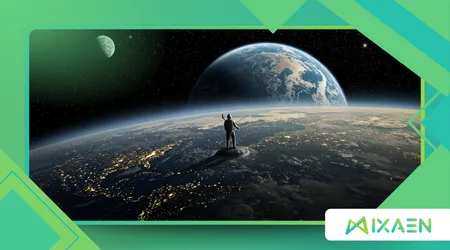What the Discovery of Earth-Like Planets Means for Humanity

The discovery of Earth-like planets sparks wonder, igniting questions about humanity’s future beyond our cosmic cradle.
Anúncios
Could these worlds redefine our existence? In 2025, exoplanet research has surged, with NASA’s James Webb Space Telescope and other missions unveiling distant worlds that mirror Earth’s conditions.
These findings fuel curiosity, challenge our understanding of life, and push technological boundaries.
This article explores how the discovery of Earth-like planets reshapes science, philosophy, and humanity’s ambitions, urging us to rethink our place in the universe.
From potential habitability to ethical dilemmas, we’ll dive into why these discoveries matter now.
A New Era of Cosmic Exploration
The discovery of Earth-like planets has transformed astronomy into a quest for life’s origins. Telescopes like Webb peer into distant star systems, revealing planets with promising traits.
For instance, K2-18b, 120 light-years away, shows signs of water vapor, a key ingredient for life. These findings drive innovation in space technology, from advanced spectrographs to AI-driven data analysis.
Scientists now hunt for biosignatures chemical hints of life on these distant worlds.
This pursuit demands global collaboration. Observatories in Chile and Hawaii work alongside space agencies to map exoplanets.
++ Detecting Life Through Methane and Oxygen Signatures in Exoplanets
The discovery of Earth-like planets fuels funding for missions like ESA’s ARIEL, set to launch in 2029.
Yet, challenges persist: light-year distances make direct exploration daunting. Still, each new planet sharpens our tools and resolve to explore further.
Imagine a telescope as a cosmic detective, piecing together clues from starlight. The discovery of Earth-like planets is like finding a new case file.
It pushes engineers to design probes capable of surviving interstellar voyages. Future missions may even deploy tiny, laser-propelled spacecraft to gather data, redefining what’s possible.

Redefining Life’s Possibilities
Could life thrive beyond Earth? The discovery of Earth-like planets suggests it might. Planets like Proxima Centauri b, just 4.2 light-years away, lie in habitable zones where liquid water could exist.
A 2023 study in Nature found that 30% of stars similar to our Sun host potentially habitable planets. This statistic hints at billions of Earth-like worlds in our galaxy alone.
These discoveries expand our definition of life. On Earth, extremophiles organisms thriving in harsh conditions suggest life could adapt to alien environments.
The discovery of Earth-like planets prompts astrobiologists to consider non-carbon-based life forms. For example, could silicon-based organisms exist on a planet with extreme heat?
Also read: What Tidally Locked Exoplanets Teach Us About Climate Extremes
Such questions stretch our imagination. Picture a coral reef, vibrant and diverse, adapting to its ocean home. The discovery of Earth-like planets is our cosmic reef, teeming with possibilities.
It challenges scientists to develop new models for life, from microbial colonies to complex ecosystems, reshaping astrobiology’s frontiers.
Philosophical and Cultural Shifts
The discovery of Earth-like planets stirs deep questions about humanity’s uniqueness. Are we alone, or part of a cosmic tapestry?
These findings challenge religious and cultural narratives, prompting debates about life’s purpose. Philosophers now grapple with whether humanity should colonize other worlds or preserve their natural state.
Culturally, these discoveries inspire art and storytelling. Films like Interstellar echo public fascination with habitable exoplanets.
The discovery of Earth-like planets fuels narratives of hope and exploration, uniting people across borders. Yet, it also raises fears: what if advanced civilizations out there view us as threats?
Read more: How Planetary Rotation Shapes the Habitability of Exoplanets
This shift reshapes education. Schools now teach astrobiology alongside traditional sciences, fostering curiosity in young minds.
The discovery of Earth-like planets invites us to see ourselves as cosmic citizens, urging a global perspective on our shared future.
Technological and Economic Impacts
Each discovery of Earth-like planets drives technological leaps. Space agencies invest in propulsion systems, like ion drives, to reach distant stars.
Private companies, like SpaceX, eye these worlds for future missions, boosting the space economy. In 2024, the global space market was valued at $447 billion, per the Space Foundation, with exoplanet research spurring growth.
These discoveries also create jobs. Data scientists, engineers, and ethicists collaborate to interpret exoplanet data.
The discovery of Earth-like planets fuels demand for AI to process vast datasets from telescopes. For example, Google’s AI tools now help identify exoplanet signals, streamlining research.
Economically, these findings attract investment. Startups develop sensors for detecting alien atmospheres, while universities train the next generation of astronomers.
The ripple effect is clear: each discovery of Earth-like planets catalyzes innovation, from robotics to renewable energy for space habitats.
Ethical and Environmental Considerations
Should we colonize Earth-like planets? The discovery of Earth-like planets raises ethical dilemmas. If life exists, disturbing it could repeat Earth’s colonial mistakes.
Scientists advocate for “planetary protection” protocols to preserve alien ecosystems. These rules ensure probes are sterilized to avoid contamination.
Environmental concerns also emerge. Mining resources on exoplanets could harm pristine worlds, echoing Earth’s ecological crises.
The discovery of Earth-like planets forces us to balance exploration with responsibility. For instance, a mission to Mars must avoid disrupting potential microbial habitats.
These debates shape policy. International treaties, like the Outer Space Treaty, now include clauses for exoplanet exploration.
The discovery of Earth-like planets demands we act as stewards, not conquerors, ensuring our cosmic ambitions don’t harm new worlds.
Table: Key Earth-Like Exoplanets Discovered by 2025
| Planet Name | Distance (Light-Years) | Habitable Zone | Key Features | Source |
|---|---|---|---|---|
| K2-18b | 120 | Yes | Water vapor detected | The New York Times, 2025 |
| Proxima Centauri b | 4.2 | Yes | Closest known exoplanet | NASA Exoplanet Exploration |
| TRAPPIST-1e | 40 | Yes | Rocky, potential for liquid water | NASA Science |
The Path Forward: Humanity’s Cosmic Ambition
What does the discovery of Earth-like planets mean for our future? It’s a call to action, urging humanity to unite in exploration.
Collaborative missions, like NASA’s partnership with ESA, pave the way for studying distant worlds. These efforts could lead to breakthroughs in understanding life’s origins.
Public engagement is key. Citizen scientists, using tools like Zooniverse, help classify exoplanet data, democratizing discovery.
The discovery of Earth-like planets inspires grassroots movements, from amateur astronomy clubs to online forums discussing alien life.
Looking ahead, these findings could guide humanity’s survival. If Earth faces crises, habitable exoplanets offer hope for relocation.
The discovery of Earth-like planets is a beacon, urging us to dream big, innovate, and protect our cosmic neighbors.
FAQs: Common Questions About Earth-Like Planets
Q: How do scientists confirm a planet is Earth-like?
A: They analyze starlight passing through a planet’s atmosphere, seeking water vapor or oxygen, using telescopes like Webb.
Q: Could we live on these planets?
A: Not yet. Distance and harsh conditions make colonization challenging, but future tech may enable it.
Q: Why focus on Earth-like planets?
A: They offer the best chance for finding life and understanding our place in the cosmos.
Q: How does this affect everyday life?
A: It drives tech innovation, creates jobs, and inspires cultural shifts, impacting economies and education.
This exploration of the discovery of Earth-like planets reveals a universe brimming with potential.
It’s a journey that blends science, ethics, and imagination, pushing humanity to reach for the stars while grounding us in responsibility.
What will you do to join this cosmic quest?
